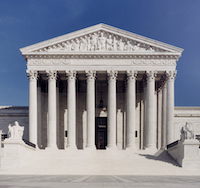Ohio Senate President Matt Huffman is on pins and needles. The U.S. Supreme Court hears oral arguments this week on an elections law case that could make his life as Ohio’s premier despot a lot easier — or not. The highly anticipated Moore v. Harper is brought by Huffman’s kindred spirits in the Republican-controlled North Carolina legislature who are trying to gerrymander their way around the state constitution and the state supreme court that upheld it.
Ohio Republicans are doing the same thing. The North Carolina GOP just got there first.
Huffman petitioned the Supreme Court to kick the legs out from under the Ohio Supreme Court for being such a stickler on the state constitution about the gerrymandered congressional (and legislative) maps Huffman and Co. forced Ohioans to contend with in the midterms. In his appeal to the court, the Lima Republican embraced the same nonsensical “Independent State Legislature (ISL)” theory that North Carolina Republicans posited in Moore.
It’s a flimsy assertion that hinges on one word in the elections clause of the U.S. Constitution, “legislature,” and a bizarre reading of said clause that has never passed muster in any court. While the Founding Fathers did give state legislatures the right to set the “Times, Places, and Manner” of federal elections, subject to congressional override, they did not intend to give state lawmakers unfettered legislative power over federal elections without input from state courts, governors, secretaries of state, election administrators, or voters.
The drafters of the Constitution feared extending absolute power to state legislatures who would inevitably abuse it. They didn’t trust state legislatures to run fair elections and only reluctantly empowered them to administer federal elections with caveats. James Madison took pains to stress that, “Legislature of the States ought not to have the uncontrolled right of regulating the times, places and manner of holding elections” because they “will sometimes fail or refuse to consult the common interest.”
How prescient of him. The common good never came up in Republican-controlled Statehouses (re-Ohio, North Carolina, Georgia, Florida, Texas, etc.) while they were gerrymandering electoral maps, passing voter suppression laws, and even justifying authority to overturn election results. But Moore argues that state lawmakers can run federal elections anyway they want; they’re free to violate the state constitution on redistricting and voting restrictions, and state courts can’t stop them.
The North Carolina Republicans appealing a gerrymandering ruling by the state supreme court claim the Constitution gives legislatures exclusive rights to regulate federal elections without interference from any state entity. But the notion that the Founders would grant unilateral power to state legislatures to set election rules with no checks and balances by any other state actor, is, well, bananas, legally-speaking.
The Supreme Court thought so. For over a century it rejected the independent state legislature theory every time it was raised. But then ISL is broadly viewed throughout the legal community, from constitutional scholars to state supreme court chief justices, as a contrived concept without merit. All 50 state chief justices felt so strongly about it they filed a rare brief to the Supreme Court deconstructing the flaws in the fringe concept resurrected in the North Carolina case — and in the right wing circles of Trump advisor John Eastman, a central figure in attempts to overturn the 2020 election.
Republican legislators in the Tar Heel State, whose gerrymandered congressional districts were blocked by the North Carolina Supreme Court as unconstitutional, (stop me if you’ve seen this movie before, Ohio) decided not to comply with state constitutional bans on gerrymandering but to nullify them with a cooked-up claim that the Constitution insulated legislatures from any stateside checks and balances over federal elections.
They gambled on the supremely activist justices in a right-wing majority accepting their tortured interpretation of the elections clause — absent textual context, long-standing historical understanding, and established precedent. Some have already signaled support for freeing state lawmaking bodies from existing curbs on electoral dictates such as gubernatorial veto, the state constitution and judicial review. Scary stuff.
Moore is a bold play for legislative autocracy that has Madison spinning in his grave. It should keep every American up at night. Beyond redistricting, a win at the Supreme Court for the independent state legislature theory has the potential to change how North Carolina and 49 other states, including Ohio, handle everything from early voting and mail-in ballots to voter ID, recounts, post-election audits, and anything else that could possibly affect an election.
Picture different rules for different elections, shattered election administration across the country, mass confusion. Sowing electoral chaos is the underlying strategy of the independent state legislature theory. Trump tried it to stay in power despite losing the 2020 election.
He lost his legal arguments for unchecked legislative power over elections. The Supreme Court declined to even hear his appeal. But today the courts’ most conservative wing is on an ideological roll. It may see Moore v. Harper as an opportunity to wipe out more precedent in a contrarian fit that defies logic and gives legal cover to Huffman and his North Carolina counterparts to rig state elections without constraint or accountability.
A ruling in favor of unfettered power portends a nightmare scenario for self-government. Huffman isn’t the only one on pins and needles.
• • •• • •
This story is provided by Ohio Capital Journal, a part of States Newsroom, a national 501 (c)(3) nonprofit. See the original story here.















